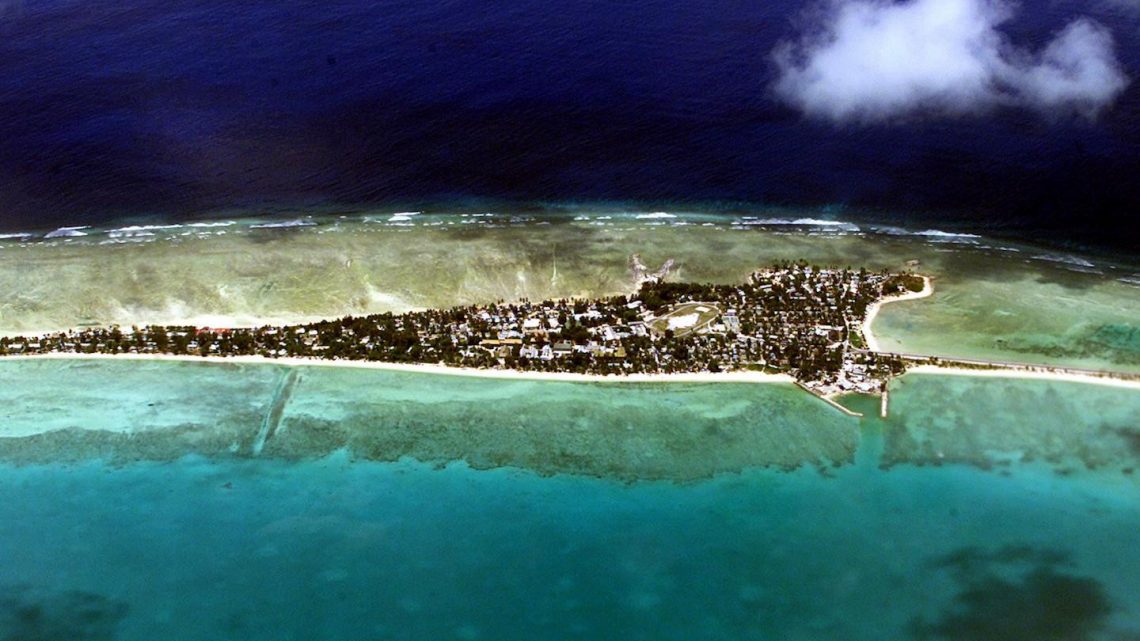
China Defends Photo of Diplomat Walking on South Pacific Locals, Accuses Australia of Doing the Same
August 24, 2020Chinese officials and i-Kiribati citizens have hit back at international criticism of a photo that went viral last week, in which China’s ambassador to the South Pacific nation was seen walking across the backs of locals as part of a welcome ceremony on the island of Marakei.
Western commentators who shared the image online expressed outrage over Ambassador Tang Songgen’s behaviour, which many suggested was symbolic of Chinese colonialism and a troubling sign of Beijing’s domineering influence in the region.
Australian politician Dave Sharma questioned whether the photo was “for real”, while US Defence attache in the Pacific Islands, Commander Constantine Panayiotou, said “I simply cannot imagine any scenario in which walking on the backs of children is acceptable behaviour by an ambassador of any country.”
Others on social media described the scene as “shameful” and “humiliating”, quipping that China was “walking all over” the people of Kiribati.
A spokesperson for the Chinese foreign ministry has since fired back at Western detractors, accusing them of being hypocritical in their outrage and feigning ignorance of local customs as part of a politically-motivated smear campaign against China.
“At the kind request of the local government and people, and out of respect to Kiribati’s culture and customs, Ambassador Tang finally agreed to accept, attending a welcoming ceremony involving local folk customs upon arrival,” said Chinese foreign ministry spokesman Zhao Lijian on Thursday—noting that the custom was “the most grand traditional welcoming ceremony on the island”.
Zhao accused critics of condemning China’ actions due to “political motives”, and pointed out that other foreign officials—including a former member of the Australian government—had been given a similar reception when they visited in the past.
“Some Australians, despite knowing that Kiribati’s islands have their unique customs, deliberately slandered and smeared China,” he said. “Back in 1998, when the then Australian high commissioner to Kiribati visited the island, local people welcomed him with the same ceremony.
“The Kiribati side is infuriated that some Australians smeared China and deliberately omitted their knowledge of the unique customs on each island of Kiribati.”
VICE News approached Phillip Allars, who was the Australian high commissioner to Kiribati in 1998, for comment, but did not receive a response by the time of publication.
A number of i-Kiribati writers and academics have also expressed discomfort with the predominantly negative dialogue that’s circulated around the image over the past week.
In a piece for The Guardian, Katerina Teaiwa—Associate Professor in Pacific Studies at the Australian National University, and a descendant from the i-Kiribati islands of Banaba and Tabiteuea—and Marita Davies—an Australian-based writer who descends from Marakei and Tabiteuea—confirmed that the practice is a fairly common and uncontroversial custom in i-Kiribati culture.
The pathway of human bodies is mostly seen at weddings, where the bride or groom arrives and processes across the backs of his or her new male in-laws, Teaiwa and Davies explain, and is considered a great honour for those lying on the ground. Equally, if someone refuses to walk across the people’s backs “the insult is immense: akin to being seen as excrement to be avoided from stepping on.
“Clearly it was adapted here for another kind of guest and to signal a new relationship,” they state. “We understand the Chinese ambassador was uncomfortable participating in the procession, but culturally and politically, to decline would have caused damage to his relationship with the people of Marakei and Kiribati more broadly.”
Rae Bainteiti, an i-Kiribati youth leader whose grandmother is from Marakei, also denounced the uninformed criticisms of people from other countries who seem to have little knowledge of local customs.
Bainteti described the controversial photograph, and the furore surrounding it, as “a stern reminder that sometimes, the global community needs to respect cultural protocols and social responsibilities that the land accords to their guests before commenting”.
Kiribati, a tiny nation on a chain of 33 atolls and reef islands in the South Pacific, has become the subject of international attention in recent years as experts predict it could be the first entire country eliminated by climate change. As seas rise, the islands are increasingly inundated by high tides, and islanders believe the sea will swallow their lands in less than a generation.


